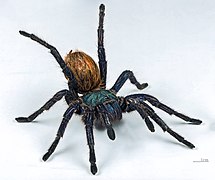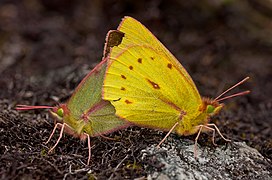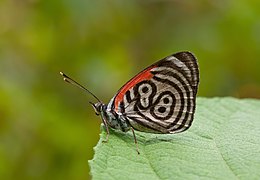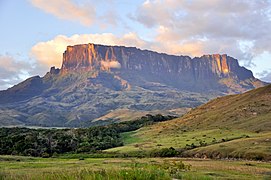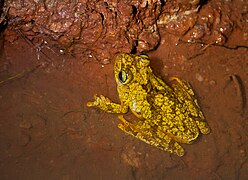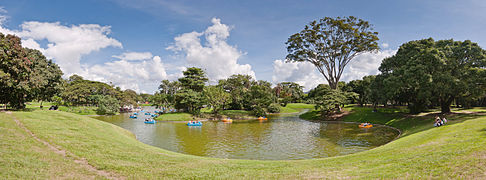The Venezuela Portal Venezuela, officially the Bolivarian Republic of Venezuela, is a country on the northern coast of South America, consisting of a continental landmass and many islands and islets in the Caribbean Sea. It comprises an area of 916,445 km2 (353,841 sq mi), and its population was estimated at 29 million in 2022. The capital and largest urban agglomeration is the city of Caracas. The continental territory is bordered on the north by the Caribbean Sea and the Atlantic Ocean, on the west by Colombia, Brazil on the south, Trinidad and Tobago to the north-east and on the east by Guyana. Venezuela is a presidential republic consisting of 23 states, the Capital District and federal dependencies covering Venezuela's offshore islands. Venezuela is among the most urbanized countries in Latin America; the vast majority of Venezuelans live in the cities of the north and in the capital. The territory of Venezuela was colonized by Spain in 1522 amid resistance from Indigenous peoples. In 1811, it became one of the first Spanish-American territories to declare independence from the Spanish and to form part of the first federal Republic of Colombia (Gran Colombia). It separated as a full sovereign country in 1830. During the 19th century, Venezuela suffered political turmoil and autocracy, remaining dominated by regional military dictators until the mid-20th century. From 1958, the country had a series of democratic governments, as an exception where most of the region was ruled by military dictatorships, and the period was characterized by economic prosperity. The 2024 presidential election were not recognized by the Carter Center and Organization of American States due to the lack of granular results, and disputed by the opposition, leading to protests across the country. (Full article...) Selected article -In September 2004, Hurricane Ivan caused significant effects in the Lesser Antilles and South America, including 44 deaths and over $1 billion in damage (2004 USD), primarily in Grenada where it was considered the worst hurricane in nearly 50 years. Hurricane Ivan developed from a tropical wave on September 2 and rapidly intensified to become a major hurricane, passing through the southern Lesser Antilles on September 7 with winds of 125 mph (201 km/h). At the time, its typical storm force winds extended outward up to 160 miles (260 km) with hurricane-force winds outward to 70 miles (110 km), and the northern portion of the eye passed over Grenada. In the region, the worst damage occurred on Grenada, where the damage total of $1.1 billion (2004 USD, ($1.77 billion 2024 USD)) represented 200% of its GDP. The hurricane damaged more than 14,000 homes and destroyed 30% of the houses, leaving about 18,000 people homeless. A total of 39 people were killed by the hurricane on the island. Elsewhere, Hurricane Ivan caused at least three fatalities and moderate damage in northern Venezuela. One person died each in Trinidad and Barbados. The name Ivan was later retired. (Full article...) Selected picture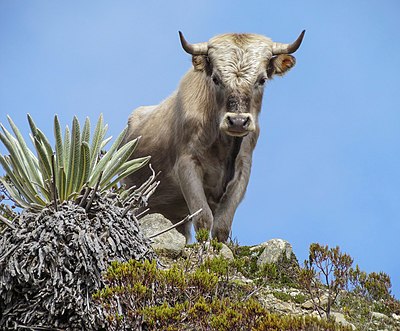
This is a feral Charolais cattle in the Venezuelan Sierra Nevada. The Charolais is a French breed of taurine beef cattle. It originates in, and is named for, the Charolais area of eastern France. Charolais are raised for meat; they may be crossed with other breeds, including Angus and Hereford cattle.
Selected biography - Fabiana Andreina Rosales Guerrero (born 22 April 1992), also known as Fabiana Rosales de Guaidó, is a Venezuelan journalist and social media human rights activist. She is married to Juan Guaidó, former disputed president of the National Assembly and claimant to the country's acting presidency in the Venezuelan presidential crisis. She was considered by the White House to be the first lady of Venezuela, but, following the dissolution of the interim government, is no longer. (Full article...) In this month...
Did you know (auto-generated) -
Selected list -The Salón de la Fama y Museo del Béisbol Venezolano (in English, the Venezuelan Baseball Hall of Fame and Museum) is a nonprofit institution operated by private interests, which was founded on April 18, 2002, thanks to the vision of Carlos Daniel Cárdenas Lares. The institution is located at Centro Sambil, in Valencia, the capital city of Carabobo State and the third largest city of Venezuela. The museum offers visitors the origins and growth of baseball in the world and the history of what is known as the National sport of Venezuela. It also shows, through its exhibitions, the most prominent players who have made significant achievements, as well as efforts to honor people who have highlighted the activity of baseball in Venezuela, recognizing and appreciating their impact on national culture and exalt those who have made outstanding contributions to the sport. (Full article...) Current events
More did you know...
TopicsCategoriesRecognized content
Featured articlesGood articles
Featured pictures
New articlesThis list was generated from these rules. Questions and feedback are always welcome! The search is being run daily with the most recent ~14 days of results. Note: Some articles may not be relevant to this project.
Rules | Match log | Results page (for watching) | Last updated: 2024-11-09 22:21 (UTC) Note: The list display can now be customized by each user. See List display personalization for details.
Things you can doWikiProjects
Related portalsAssociated WikimediaThe following Wikimedia Foundation sister projects provide more on this subject:
Discover Wikipedia using portals |



